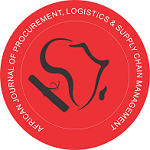Hanson Obiri-Yeboah1 | Eric Ekow T. Ghansah1
1Procurement & Supply Chain Department, Accra Technical University
1PGhana Institute of Management & Public Administration (GIMPA)
Abstract
Global Logistics Scene is dominated by a handful of ten to twelve multinational Companies followed by smaller companies altogether numbering below fifty. Entire global trade is facilitated by these service providers. Major players in the field are led by DHL, Kuehne + Nagel, Schenker/BAX, UPS, Geodis, Expeditors, Agility, CEVA Logistics, Hellman worldwide logistics, etc. The last two decades have seen the emergence of multinational companies having acquired and bought out local and smaller players to acquire the multinational status coupled with the global network. The entire logistics field is filled with mergers and acquisitions in quick succession in the recent past. Most of the logistics players have been traditionally freight forwarders dealing with cargo bookings coupled with origin and destination services. However, as the global business practices changed, and supply chain managements started gaining ground, these companies realized the potential of being able to offer multiple services including ground transportation, warehousing, and contract logistics under one umbrella as the future trend and quickly turned themselves to acquire the required capabilities and have managed to become single window service providers on global scale. In any supply chain, these 3PL Service Providers further outsource certain functions and segments to many other local service providers. Any Supply Chain Management expert would naturally wonder if it is possible to deal directly with the other service providers and cut out the 3PL Lead provider and thereby save some cost.
Keywords: Role of Logistics, Freight Forwarding, & Supply Chain Management

